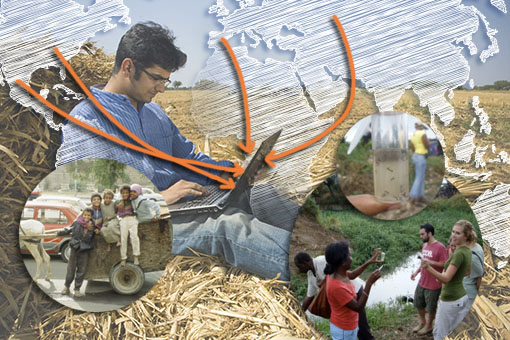Online Global Health Certificate Appeals to Professionals, Students
By Matt Windsor

From an apartment in central Asia, Birmingham ophthalmologist C. James McCollum, M.D., dialed home for assistance. “I was working in the area of childhood blindness,” says McCollum, a 1988 graduate of the UAB School of Medicine and current director of the emergency department at UAB’s Callahan Eye Hospital. But as he treated patients in Uzbekistan and Kyrgyzstan, McCollum realized something was missing.
“I have long been interested in working overseas,” he says. “I feel it is something God put on my heart at a young age. That desire shaped many of my educational choices, including the decision to study ophthalmology after medical school, but I had no background in public or global health.”
Looking for a “knowledge base, tools, and perspective that would help me better serve the people in those countries,” McCollum discovered the online certificate program in global health studies offered by the UAB School of Public Health. He enrolled in the 15-hour program while still working in Uzbekistan and completed his coursework after he returned to Birmingham.
By day, McCollum was visiting residential schools for children with visual disabilities, identifying those who might benefit from surgery. In the evenings, he learned about infectious diseases, needs assessments, and project design in his online classes. “I enjoyed the readings, the interaction with other faculty and students, and the assignments, which gave enough latitude to help me learn in areas that were most applicable to my interests,” he says.
On-the-Job Training
Students all over the world just like McCollum—well-trained in their fields but seeking international health perspectives—have been attracted to the global health studies certificate program, says Craig Wilson, M.D., director of the Sparkman Center for Global Health in the School of Public Health.
|
The glamour, risk, and sheer usefulness of NGO positions makes them very difficult to attain, Elliott notes. "People from all over the world want these jobs. Having a certificate like this gives you an edge, no question.” |
Other students are eager to learn more about global health issues before they go overseas. Leah Neiderer graduated from the Peace Corps Master’s International Program in the School of Public Health in December 2012. But she also completed the global health studies certificate before leaving for Nicaragua in March 2013 as a Peace Corps Volunteer. “It was beneficial to learn about international perspectives on health before going out into the field,” she says.
“What we’re really offering is a perspective,” Wilson explains. “When you’re working internationally, you have to consider development—it’s not just giving malaria vaccinations, but setting up entire health systems. Then there’s culture. What works in one community won’t necessarily work in another.”
Many students are physicians or nurses with a desire to work internationally, Wilson says. “Medicine trains you to sit across the table from someone and find out what’s wrong,” he says. “Public health focuses on how to make that work across an entire system. How do you implement vaccine programs or water purification programs?”
What They Don’t Teach You in the Field
The global health studies program launched in 2008. Enrollment has been rising steadily as word has spread, Wilson notes. The program had 50 students in 2012, nearly doubling its 2011 enrollment. Students must complete one required course on global health principles and practices, along with four electives.
These offerings respond to student demand, Wilson notes. In 2012, student requests led to the addition of a course in NGO [non-governmental organization] management, taught by Elizabeth Elliott, Ph.D., who has worked in international health for decades, beginning with a stint in Palestinian refugee camps in Beirut in 1982. (Elliott also teaches a course in refugee health as part of the certificate program.)
In the NGO course, which is one of the few available in the country, Elliott shares hard-won lessons. “In most ways, NGO management isn’t that different from running a coffee shop,” she says. “You work with budgets, you write job descriptions, you deal with lots of paperwork. The setting is glamorous, but the work itself is often not glamorous at all.”
Each week, students in her class tackle real-life scenarios: “What do you do if a national worker pressures you into hiring his brother?” Elliott says. “How do you create a realistic budget? How do you deal with donors when they are making unrealistic requests?”
International Advantage
Elliott’s current class includes a surgeon from Chile who is looking to expand his outreach work in Nicaragua, a researcher at Drexel University in Philadelphia, a physician now studying in the United States who once ran a major children’s hospital in Pakistan, students from Venezuela and Mexico, and several graduate students from UAB.
“The students have such a variety of backgrounds and perspectives that they can all learn from each other,” Elliott says. “It is particularly helpful for the students who don’t yet have much international experience.”
The glamour, risk, and sheer usefulness of NGO positions makes them very difficult to attain, Elliott notes, and any additional training a student can add to his or her resume will help. “In the NGO world, they expect you to know how to do all these things before you get hired—preparing a budget, creating a logical framework analysis,” she says. “And your competition isn’t just from the U.S.; people from all over the world want these jobs. Having a certificate like this gives you an edge, no question.”
Throughout the certificate program, the emphasis is on field-ready knowledge rather than academic theory. “We’re training students to see the world in a new way,” Wilson says. “And giving them the tools they need to succeed in an international setting, both for themselves and for the people in their care.”